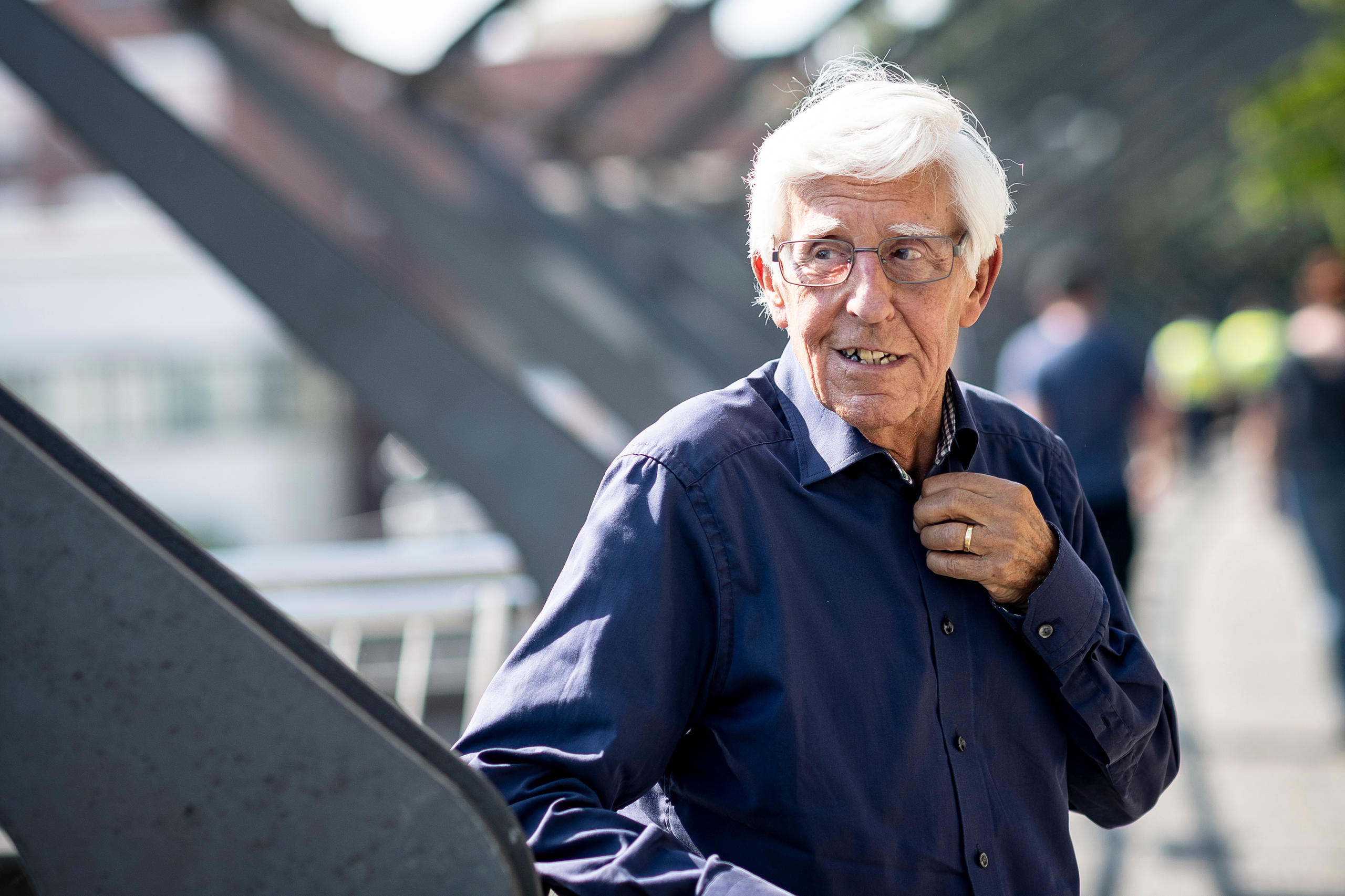
‘Dürrenmatt experienced and observed various epidemics’

The Swiss author and dramatist Friedrich Dürrenmatt was one of the sharpest critics of society and politics of his time. But how, and why, should his works be read today? And which contemporary writers fill his shoes? We interviewed literary academic Peter von Matt on the centenary of Dürrenmatt’s birth.
swissinfo.ch: How relevant is Dürrenmatt’s social criticism today – in relation to the current international crises and for Switzerland?
Peter von Matt: Dürrenmatt was a keen observer of societal and social processes. He liked to create bitingly critical narratives from his observations. As readers today, we have to relate them to concrete political events in our own countries or in the world. Then we see where Dürrenmatt’s criticism applies to the politics of Switzerland or other places and where he diagnoses serious errors made by governments. As a storyteller, he can depict these processes much more tangibly than through purely political analysis.
Peter von Matt, born in 1937, was a professor of German literature at Zurich University. He knew Friedrich Dürrenmatt personally and has written extensively about him. His numerous works include the books Intrigue: Theories and Practice of Trickery and The Calf in front of the Gotthard Mail Coach. On the Literature and Politics of Switzerland.
swissinfo.ch: To what extent did Dürrenmatt anticipate the Covid crisis with his short story The Virus Epidemic?
P.v.M.: Throughout his life, Dürrenmatt experienced and observed various epidemics, such as polio, for which no vaccine existed when he was a child, and other, often fatal diseases. He himself suffered from serious health problems. This made him aware of different medical procedures. He was familiar with death from an early age. He did not anticipate the current pandemic, but he knew how people turn to misguided and often dangerous remedies in response to sudden outbreaks of contagious disease. His short story is, among other things, a funny analysis of wrong behaviour in the face of an unexpected epidemic.
swissinfo.ch: How would Dürrenmatt comment on our times?
P.v.M.: He would observe people’s unpredictable collective reactions: their indifference, which then gives way to panic, but also their tendency to shake off their own fears by accusing others, especially governments. Complaining about other people’s mistakes makes them feel better, even though they may be seriously harming themselves by refusing to obey official orders. The desire to immediately look for and find someone to blame would be fruitful ground for any writer.
swissinfo.ch: Would you say that Dürrenmatt’s criticism went beyond not only the borders of Switzerland but also his time?
P.v.M.: Dürrenmatt had a wild and unpredictable imagination. He thought passionately about coming times and situations, but with equal energy and acuity about the distant past and how people did things back then. With his creative power, he was able to describe the lives and thoughts of people in ancient Greece, but also in a civilisation 500 years after us, just as grippingly as if he had actually been there. We can experience this in The Virus Pandemic. We know he is letting his imagination run freely, yet it is as though the action were set today. I once heard him say: “There is nothing new in the world; it is all age-old.” I thought this was a rather crazy assertion, but I later realised how true it is.
swissinfo.ch: Are we lacking a critic like Dürrenmatt today?
P.v.M.: When a person like that dies, it is always a great loss. But I also take his words which I have just quoted seriously here: if everything is age-old, then the present has the same significance as the far-off past. So there is surely a little boy running around somewhere today who has, blazing inside him, the same creative imagination as the author of the comedy The Visit and the eerie story A Dangerous Game.
Writers like Dürrenmatt remain important today as they warn us of states’ enormous potential for terrorism; they have tremendous power over their citizens, and this must be kept in check. Writers and artists have a duty to keep a watch on the state, and to show it in such a way that people are aware of what is going on.
swissinfo.ch: Can authors still do this?
P.v.M.: Great minds still live among us. Take Lukas Bärfuss, for instance. He is a keen and aggressive thinker, also in the political field. This makes him unpopular with many readers. He knows this, but he doesn’t care. Certainly, some people prefer authors who are just funny and entertaining. But we need women and men writers who accuse – clearly and fearlessly – when something is wrong. I am also thinking here of Ruth Schweikert and Sibylle Berg.
swissinfo.ch: How do you see the role of the media and intellectuals in general?
P.v.M.: “The media” and “intellectuals” are not a homogeneous entity but a whole colourful world. Anyone who studies them in earnest soon discovers their diversity. I do not need all of it or all of them; but I always need some of them. And if some do get on my nerves, they may well be the very ones who are of greatest use to others. We often learn a surprising amount from those things that annoy us. And as long as we are still learning something, we are still alive.

In compliance with the JTI standards
More: SWI swissinfo.ch certified by the Journalism Trust Initiative





























You can find an overview of ongoing debates with our journalists here . Please join us!
If you want to start a conversation about a topic raised in this article or want to report factual errors, email us at english@swissinfo.ch.